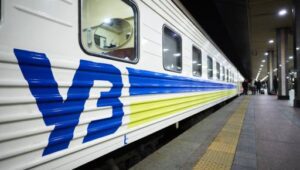
JSC “Ukrzaliznytsia” (UZ) has appointed commuter trains from Kharkiv to Kramatorsk and Slavyansk.
The company said in a Telegram that trains will run from Feb. 2:
No. 6812 Kramatorsk-Kharkiv. Departure from Kramatorsk – at 7:25, arrival in Kharkiv (via Slavyansk, where the train will stop at 7:48) – at 13:00;
#6813 Kharkiv-Slaviansk. Departure from Kharkiv – at 13:40, arrival in Slavyansk – 18:41.
As reported on 14 October, Ukrzaliznytsia resumed railway service to Kramatorsk (Donetsk Region), where trains have not run since early April last year.

Already 83 stores, or 74%, of Foxtrot chain are autonomous, they can continue full work in autonomous mode even in case of emergency power cuts, the company’s press service said.
“There is a desire and willingness among customers to buy appliances, which encourages us to continue our movement toward energy independence,” Acting Chief Operating Officer Danila Veklenko was quoted as saying in the release.
These stores are equipped with powerful charging stations, generators (own or in the mall), lanterns, lamps, satellite Internet systems, which allows us to provide quality service and all the stated services. Also – in a number of stores visitors can charge their gadgets and work with access to wi-fi.
In the future plans of the retailer – to expand the list of stores that can fully operate regardless of the power outage schedule. Particular attention will be paid to the installation of satellite internet systems or the introduction of effective solutions in conjunction with regional providers to improve the operation of services that are directly dependent on the availability of internet: digital payment types, online ordering, etc.
As reported, Foxtrot started the process of providing its retail chain with autonomous power supplies after the first massive rocket attacks in October 2022.
“Foxtrot” is one of the largest retail chains in terms of the number of stores and sales of electronics and home appliances in Ukraine. As of early 2022, the brand is omni-channel (offline and online sales). As of January there are 114 stores in the network, 2 of which are in the format of Internet-order points.
The Foxtrot brand is developed by the Foxtrot group of companies. The co-founders are Valery Makovetsky and Gennady Vykhodtsev.

As the press-service of the company informed Interfax-Ukraine, the co-working occupies more than 757 sq.m in BC Platinum (3A, M. Grishko Str.) and 1017 sq.m in BC Eurasia (75, Zhilyanskaya Str.).
According to the press service of CHERDAK, the cost of a non-fixed workplace is $150/month, fixed $190/month, single entrance – 300 UAH.
CHERDAK network of co-working centers plans to expand its activities in the office facilities of Dragon Capital, negotiations are now underway.
Dragon Capital is one of the largest investment and financial services groups in Ukraine and provides a full range of investment banking and brokerage services, private equity, asset management for institutional, corporate and private clients. The company was founded in 2000 in Kiev. One of the key activities of Dragon Capital are investments in real estate market.
Its commercial real estate portfolio is managed by Dragon Capital Property Management. As of November 2022 there are 29 commercial properties under management, including 13 office properties, six retail properties and 10 logistic complexes.
BUSINESS CENTERS, CHERDAK, co-working centers, DRAGON CAPITAL

Finnish telecommunications equipment manufacturer Nokia will increase the number of routers provided to Ukraine to equip schools to 5 thousand routers, said Deputy Prime Minister – Minister of Digital Transformation Mikhail Fedorov after a meeting with Nokia CEO Pekka Lundmark in Davos.
“After February 24, we received 1,770 routers from Nokia, which provide Internet for school shelters. A second batch of 3,230 more routers will arrive soon. They will allow tens of thousands of children to safely continue learning in school shelters during air raids,” Fedorov wrote in his telegram feed Friday.
Also among future projects, he said, is the construction of an Internet backbone line across the Black Sea.
“This will make Ukraine more attractive to top technology companies such as Amazon and Meta,” the deputy prime minister said.
He added that Nokia’s CEO also suggested creating a local group of experts to advise on the restoration, sustainability and modernization of Ukraine’s digital infrastructure.
Import of goods in Jan-Oct 2022 in most important positions and in relation to same period in 2021

Source: Open4Business.com.ua and experts.news

Ukraine since the beginning of 2022/2023 marketing year (July-June) and until January 20, 2012 exported 25.14 million tons of cereals, including 14.22 million tons of corn (56.6% of total shipments), 9.1 million tons of wheat (36.1%) and 1.73 million tons of barley (6.8%).
As reported on the website of the Ministry of Agrarian Policy and Food on Friday, the rate of grain exports since the beginning of the current MY is 30.34% lower than the same period of the previous MY, when from July 1, 2021 to January 20, 2022, 36.08 million tons were delivered abroad. In this case, the previous maximum rate of exports was achieved on January 9, 2023, when the lag from last year’s values was the lowest for the entire MY 29.61%.
According to the Ministry, from the beginning of 2022/2023 MY to January 20 this year, Ukraine exported 9.1 million tons of wheat (1.82 times less compared to the same period last year), 1.73 million tons of barley (3.11 times less) and 12.5 thousand tons of rye (12 times less). At the same time, exports of corn exceeded last year’s volume: 14.22 million tons were exported, which is 3.6% more than it was in 2021/2022 MY on the same date, while 76.5 thousand tons of flour (+23.1%).
It is specified that since the beginning of January, Ukraine exported 2.39 million tons of grain, including 1.59 million tons of corn, 671 thousand tons of wheat, 108 thousand tons of barley and 7.5 thousand tons of flour.
As follows from the Ministry data, during the period of January 9-20, an average of 140 thousand tons of cereals per day were supplied to the foreign markets, whereas during the preceding period of January 2-9, an average of 121.7 thousand tons per day were supplied to the foreign markets, during December 21 – January 2, an average of 196.4 thousand tons per day, during December 14-21 – 134.3 thousand tons per day and during December 2-14 – 148.6 thousand tons per day. Thus, the average daily rate of exports during the reporting period January 9-20 has increased by 15% compared to the previous period January 2-9.
As reported, Ukraine in 2021/2022 MY exported 48.51 million tons of grain and leguminous crops, which is 8.4% higher than in the previous MY, despite the full-scale invasion of Russia and the difficulties with the export of agricultural products due to the blockade of Ukrainian seaports. 18.74 million tons of wheat (12.6% more than in 2020/2021MY), 23.54 million tons of corn (+1.9%), 5.75 million tons of barley (+35.9%), 70.9 thousand tons of flour (-44.1%) were supplied to foreign markets.
Ukraine in 2020/2021 MY exported 44.72 million tons of grain and leguminous crops: 16.64 million tons of wheat, 23.08 million tons of corn, 4.23 million tons of barley, 126.9 thousand tons of flour and 18.4 thousand tons of rye.
In 2019/2020, Ukraine exported 56.72 million tons of grain and leguminous crops.